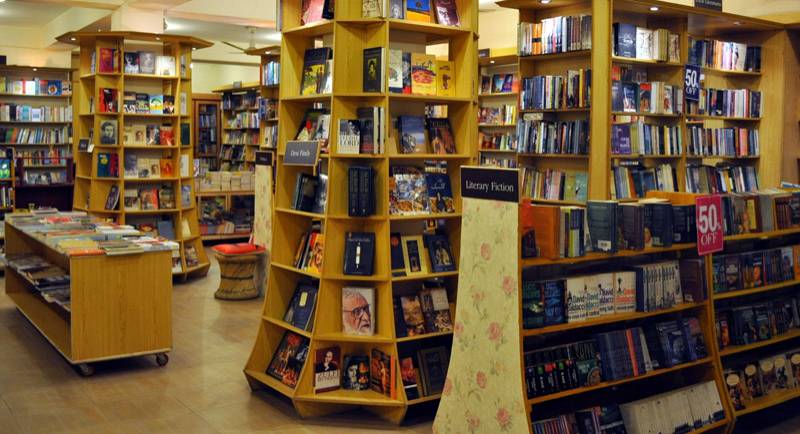
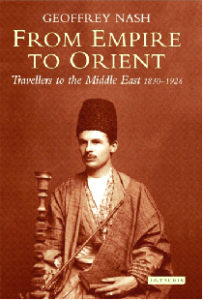
From Empire to Orient: Travellers to the Middle East 1830-1926
Geoffrey Nash
I.B.Tauris (2005)
From Empire to Orient offers an alternative perspective on Britain’s late imperial period by looking at the lives and the writings of the men who chose to defy the conventional social and political attitudes of the British ruling classes towards the Near East. Between the Greek revolt in 1830 and the fall of the Caliphate in 1924 a different kind of voice was heard that was both anti-Imperialist and pro-Islamic. Geoffrey Nash places David Urquhart’s passionate belief in the ideal of municipal government in Turkey, W.S. Blunt’s enthusiasm for the Egyptian reformers of the Azhar and Marmaduke Pickthall’s advocacy of the cause of the Young Turks into their political and historical context and into the context of their writings.
Geoffrey P. Nash is Lecturer in English at the University of Sunderland. He was educated at Oxford and London universities and was previously an Associate Professor at the University of Qatar.
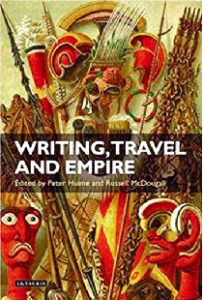
Writing, Travel and Empire
Peter Hulme, Russell McDougall
I.B.Tauris (2007)
The British Empire drew on the talents of many remarkable figures whose lives reveal a wonderfully rich interweaving with the crucial issues of the period. In some cases they left a legacy of travel writing, novels, biography and ethnography which made important contributions to our knowledge of other cultures. Writing, Travel and Empire explores the lives and writings of ten such figures, including Sir George Grey, Winwood Reade, Roger Casement, and Gertrude Bell. Embracing issues such as gender and travel, racial science, the globalisation of ‘native management’, the internal colonies, and with a geographical coverage that extends from South America to Russia via Africa and the South Seas, the essays will engage all those with an interest in cultural geography, postcolonial studies, anthropology, biography and travel writing.
Peter Hulme is Professor in the Department of Literature, University of Essex, UK.
Russell McDougall has published widely on West African, West Indian and Australian literatures and histories. He is Associate Professor in English at the University of New England.
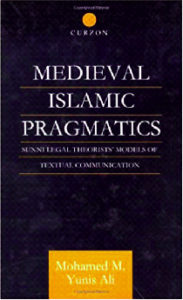
Medieval Islamic Pragmatics: Sunni Legal Theorists’ Models of Textual Communication
Muhammad M. Yunis Ali
Routledge (2000)
This book deals with two different pragmatic approaches to textual communication: (i) the mainstream approach followed by the ‘Ash’ari s, Hanafi s and Mu’tazili s, (ii) the salafite approach followed mainly by the Hanbali s, defended and elaborated by Ibn Taymiyyah. One of the primary aims of the book is to explore and formulate several Muslim legal theorists’ pragmatic theories, communicative principles and linguistic views, construct them in the form of models and set them within a general uniform framework. Another aim is to reveal a corpus of information and data which, though highly relevant to modern pragmatics, is still unknown. This study, which can be seen as an extensive introduction to ‘medieval Islamic pragmatics’, is the first attempt to examine the approaches followed by the Salafi s or the mainstream from a pragmatic viewpoint. There has been no attempt to explain the principles and the strategies utilised by the medieval Sunni Muslim legal theorists in their account of how communication works and how successful interpretation is achieved. Of course, a lot of work has been done on different Islamic sects and their different positions over the interpretation of the Quran and Sunnah, but these studies fall short of delving into the underlying communicative principles that motivate their differences over interpretation. The author’s formulation of the Muslim legal theorists’ views is enhanced by setting up a reliable theoretical foundation and by delving into their underlying philosophical principles. This involves relating the legal theorists’ insights into interpretation and communication to their relevant ontological, epistemological and theological outlooks, and comparing these insights with their modern pragmatic counterparts.
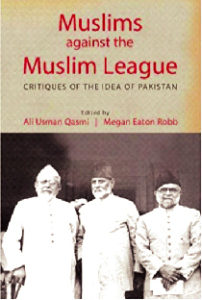
Muslims against the Muslim League
Ali Usman Qasmi, Megan Eaton Robb
Cambridge University Press (2017)
The popularity of the Muslim League and its idea of Pakistan has been measured in terms of its success in achieving the goal of a sovereign state in the Muslim majority regions of North West and North East India. It led to an oversight of Muslim leaders and organizations which were opposed to this demand, predicating their opposition to the League on its understanding of the history and ideological content of the Muslim nation. This volume takes stock of multiple narratives about Muslim identity formation in the context of debates about partition, historicizes those narratives, and reads them in the light of the larger political milieu of the period. Focusing on the critiques of the Muslim League, its concept of the Muslim nation, and the political settlement demanded on its behalf, it studies how the movement for Pakistan inspired a contentious, influential conversation on the definition of the Muslim nation.
Ali Usman Qasmi is Assistant Professor in the Department of History at the Lahore University of Management Sciences, Pakistan. He is the author of Questioning the Authority of the Past: The Ahl al-Qur’an Movements in the Punjab (2012) and The Ahmadis and the Politics of Religious Exclusion in Pakistan (2015).
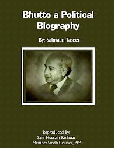
Bhutto: A Political Biography
Salmaan Taseer
Vanguard Books (2019)
Zulfiqar Ali Bhutto came from a wealth family of feudal landowners in Sindh. Although westernized by education in the United States and in England, he became the champion of the Third World when he was appointed the youngest Foreign Minister in Asia in 1962.
Disillusioned with his one-time mentor, President Ayub Khan, he orchestrated civilian demonstrations which toppled him from power. A skillful and sophisticated politician, he nevertheless failed to prevent (and some say le even provoked) the bloodbath which led to the secession of Bangladesh.
He assumed power in the aftermath of the debacle, and swept the general elections in West Pakistan with a slogan of ‘iroti kapara makan’ ‘food, clothes and shelter’. Bhutto’s regime, which began with so much promise, eventually fell to an army coup amid charges of violence and oppression. His trail, which lasted nearly two years, caused world-wide sensation. In spite of pleas for clemency from many heads of state, he was hanged on 4 April 1979.
His courage in the face of death made him a martyr whose shadow will fall on the politics of Pakistan for years of come. Salmaan Taseer’s political biography provides unique insight into this dramatic career and into the political structure of Pakistan. The author interviewed Bhutto on several occasions and reveals hitherto unknown facts about his rise and fall, and provides an ac-count of intrigue, feudalism, populism and religion which is highly relevant to what is happening in Pakistan today.
Salmaan Taseer was born in Simla in 1944. His father was Dr MD Taseer, an eminent educationalist, scholar, writer and poet. Faiz Ahmed Faiz, the celebrated poet and Lenin Peace Prize winner, is his uncle. He was educated in Lahore, at St Anthony’s High School and Government College, after which he qualified in England as a Chartered Accountant. Journalism and politics, however, remain his first love. He was the Pakistan correspondent of the Far Eastern Economic Review and a stringer for the London Economist. In 1969 he was the Treasurer of the PPP in Karachi and one of its earlier members. In 1972 he helped to bring out the weekly Outlook, which was suppressed by Bhutto for outspoken criticism of his regime.

